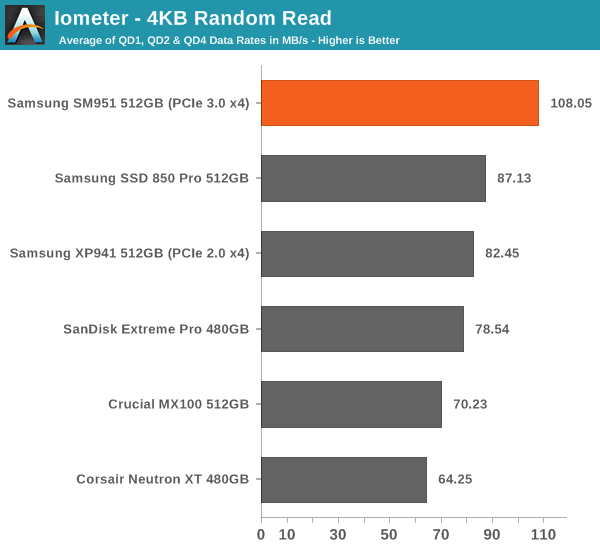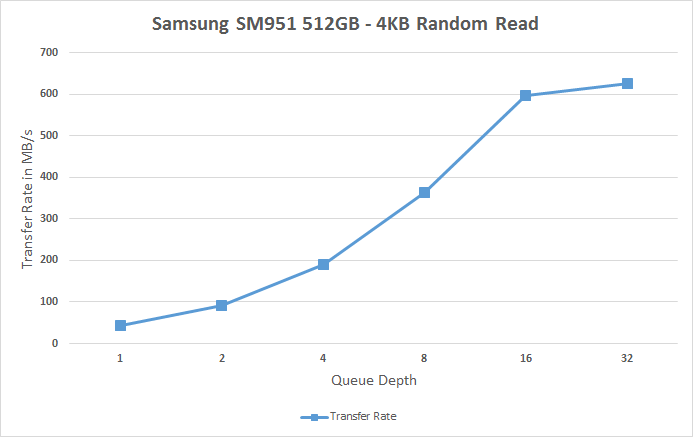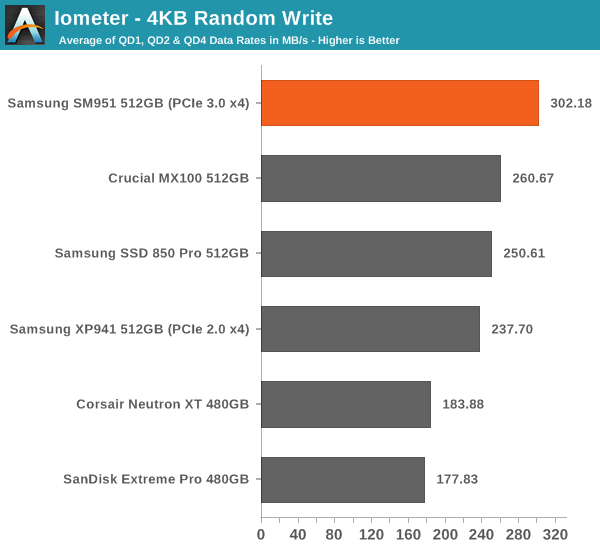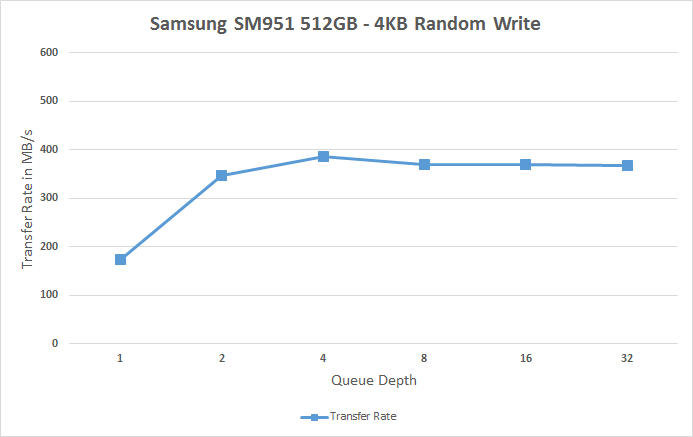Samsung SM951 (512GB) PCIe SSD Review
by Kristian Vättö on February 24, 2015 8:00 AM ESTRandom Read Performance
One of the major changes in our 2015 test suite is the synthetic Iometer tests we run. In the past we used to test just one or two queue depths, but real world workloads always contain a mix of different queue depths as shown by our Storage Bench traces. To get the full scope in performance, I'm now testing various queue depths starting from one and going all the way to up to 32. I'm not testing every single queue depth, but merely how the throughput scales with the queue depth. I'm using exponential scaling, meaning that the tested queue depths increase in powers of two (i.e. 1, 2, 4, 8...).
Read tests are conducted on a full drive because that is the only way to ensure that the results are valid (testing with an empty drive can substantially inflate the results and in reality the data you are reading is always valid rather than full of zeros). Each queue depth is tested for three minutes and there is no idle time between the tests.
I'm also reporting two metrics now. For the bar graph, I've taken the average of QD1, QD2 and QD4 data rates, which are the most relevant queue depths for client workloads. This allows for easy and quick comparison between drives. In addition to the bar graph, I'm including a line graph, which shows the performance scaling across all queue depths. To keep the line graphs readable, each drive has its own graph, which can be selected from the drop-down menu.
I'm also plotting power for SATA drives and will be doing the same for PCIe drives as soon as I have the system set up properly. Our datalogging multimeter logs power consumption every second, so I report the average for every queue depth to see how the power scales with the queue depth and performance.

While the other SSDs hover at 60-90MB/s for random reads, the SM951 provides a rather noticeable upgrade at 108MB/s.
 |
|||||||||
Looking at the performance more closely reveals that the SM951 delivers better performance at all queue depths, although obviously the difference is at high queue depths where the SM951 can take advantage of the faster PCIe interface. The SM951 actually does over 150K IOPS when the MB/s is translated into throughput.

Random write performance is equally strong. The line graphs shows how the SM951 shifts the whole curve up, implying a performance increase at all queue depths. Especially the performance at queue depths of 1 and 2 are noticeably better than on other drives.
 |
|||||||||










128 Comments
View All Comments
Kristian Vättö - Sunday, March 1, 2015 - link
The 840 EVO issue takes weeks, even months to show up, so testing it is not something that we can really incorporate in our test suite.The read speed depends on the test you use and its specifications. The figures are always "up to" and tend to be based on high queue depth 128KB sequential read performance. You may want to try multiple benchmarking apps, but especially ATTO tends to show high performance since it tests multiple IO sizes.
And yes, we run the SSD as a secondary drive to eliminate any OS overhead.
MFinn3333 - Saturday, February 28, 2015 - link
Is there any way you can review the Fujitsu FSX 240GB? It's an old drive but it is the only consumer level drive that I am aware of that uses entirely SLC?Kristian Vättö - Sunday, March 1, 2015 - link
At least for now it's not in the review queue, but I will keep it in mind in case I have excess time.kenshinco - Monday, March 2, 2015 - link
How can we get the sm951 to runs up to the rated speed? The rated speed for 512gb is 2.15gbs/1550mbs read/write, but i got only 1560mbs/1570mbs read/write. I got temp monitor never pass 75 when testing.Kristian Vättö - Monday, March 2, 2015 - link
I was able to achieve 2250MB/s with 128KB sequential read (QD32) on an empty drive, which is how the read performance has been rated. That's not a realistic bench, though, because in reality you will never be reading from an empty drive.Gonemad - Thursday, March 5, 2015 - link
No word on Novachips 8TB SSD yet?http://www.theregister.co.uk/2015/03/05/eight_tera...
CallsignVega - Friday, March 6, 2015 - link
I just purchased the SM951 from the UK (512GB for $450). They are out there, you just have to know where to look.vegipiniata - Wednesday, March 11, 2015 - link
I got one SM951 512GB for 340£They were gone later that day.
Have Z97 Extreme9 and can't set it as the boot drive though :(
Bios 1.3 from DEC 2014
any chance it's the BIOS fault (too old)?
Stas - Friday, March 13, 2015 - link
There we go. Finally an incentive to upgrade from 2500k to a new platform. Once mobos with M.2 and NVM hit the market in Summer/Fall, I will be retiring the faithful rig.Edgar_in_Indy - Friday, March 13, 2015 - link
The 2500k is too good to retire!When I upgraded my main system a few weeks ago, I recycled my old 2500k and the board for use in a living room HTPC build that can handle 4K video files and do some gaming, all while running Windows Media Center with 5 ATSC tuners.